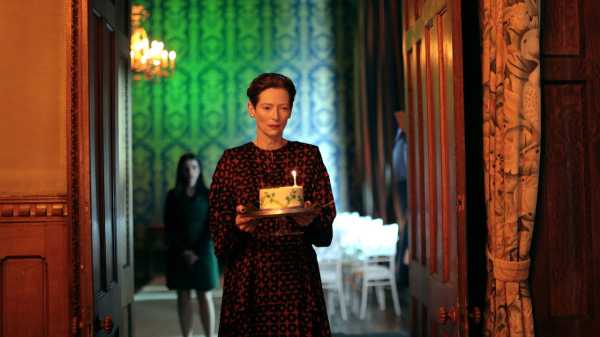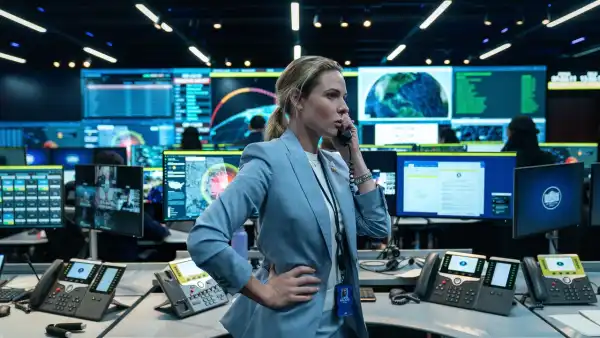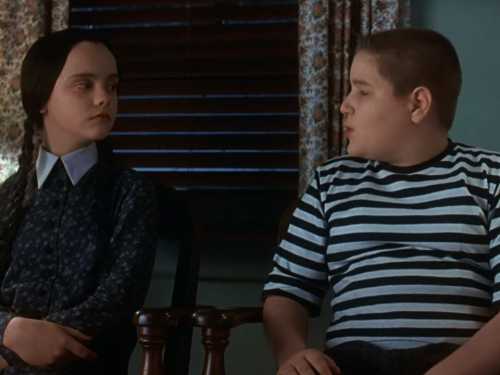
My favorite dual role in movies—other than Charlie Chaplin’s, in “The Great Dictator,” of course—is the mother and daughter played by Frances Farmer, in Howard Hawks’s “Come and Get It.” I’m reminded of this by Tilda Swinton’s spectacular achievement as mother and child, in Joanna Hogg’s new film, “The Eternal Daughter” (opening Friday in theatres and on video on demand). Unlike Farmer’s roles, which are secondary to the movie’s male lead character, at least one of Swinton’s two characters is onscreen in every scene, and the movie’s few other actors are in supporting roles. “The Eternal Daughter” is very much a two-hander for one actor, an astonishing tour de force for Swinton’s art and for Hogg’s writing and direction—all the more so inasmuch as it’s a sequel, the third in a series. As in Hogg’s “The Souvenir” (2019) and “The Souvenir: Part II” (2021), Swinton plays Rosalind, the mother of a young film student named Julie Hart (Honor Swinton Byrne, Swinton’s real-life daughter). Now, in “The Eternal Daughter,” Julie returns, as a middle-aged woman (Swinton) who, in chilly late November, takes the elderly widow Rosalind (also Swinton) on a brief vacation in Wales, in a remote and majestic hotel. They are there to celebrate Rosalind’s birthday; Julie is plotting to make a movie about her mother.
“The Eternal Daughter” is a keenly discerning movie about the relationship of mother and daughter, who are bound together by a fierce love but kept apart by unbridgeable differences of character and of experience. Theatrically elaborate and nuanced, the film attains a level of hushed and whispery detail that suggests dramatic hyperrealism, as if it were made with cameras of resolution higher than the eye can perceive. Swinton’s performances are more intimate than those in any classic movie I can think of, and adorned with a dazzling array of behavioral and linguistic wisps and whorls. Yet Swinton isn’t the sole focus of the movie’s fanatically detailed attention. The hotel, a converted ancient mansion, is seemingly a character unto itself, and the only one that competes with mother and daughter for dramatic impact—because it’s haunted. For all the probing, urgent realism of “The Eternal Daughter,” the film depends not only on technical artifices—ones that make it possible for Swinton to share scenes and even images with herself—but on metaphysical artifice. It’s a ghost story.
It’s a graceful and fluid movie to watch but a difficult one to describe or even to grasp, seemingly by design. It’s mysterious, elusive, and, for all its weighty and palpable physical reality, for all its pressing concentration on its characters and their surroundings, it shunts much of the action not offscreen but to what’s in the frame but invisible—to spiritual presences that are both ubiquitous and inaccessible. Which is to say that the movie turns its metaphysical premise inside out, realizing it by means of plain special effects and simple devices—the first of which is a mere line of dialogue. As the movie opens, the two women and Rosalind’s faithful dog, Louis, are arriving by taxi to the inn; their driver (August Joshi) tells them that he avoids the hotel at night, owing to a sighting of a person in the window of an unoccupied ground-floor room. This setup—call it Chekhov’s ghost—makes surveillance of the ground-floor windows a key focus of the drama. Even apart from any awaited apparitions, though, the movie is filled with uncanny virtual presences that are invoked by the merest of banalities.
As Julie checks into the hotel, the officious young desk clerk (Carly-Sophia Davies) tells her that the second-floor room she’s reserved is unavailable—and she wants to park Julie and Rosalind in a ground-floor room instead (hint, hint). The hotel seems, however, to be completely devoid of other guests—not a single one is seen throughout the pair’s stay, and the keys for each room are still hanging in their respective slots. It’s only when, by special dispensation, mother and daughter are temporarily parked in a room upstairs that the building’s hidden souls begin to emerge, in the form of memory—and of history. Julie and Rosalind, as it turns out, didn’t select the hotel by chance. It was originally a private mansion and the home of Rosalind’s aunt, who took in Rosalind and other young relatives during the Second World War, to spare them the bombing of London. Each room that Rosalind enters, starting with the one in which they sleep, gives rise to a new round of her recollections, which she divulges to Julie with a matter-of-fact equanimity regarding even tragic and pain-filled events. Hogg’s view of the intimate gulf between the two women is essentially historical, a generation gap rooted in the incommensurable difference of the times they’ve lived in, and its decisive effect on their character, on their expectations, on their very identity.
The women fill their days and nights with minor activities, which grow increasingly charged with oddities, tensions, and perturbations that occasionally discharge a spark of creative energy. Even such trivialities as Julie’s nocturnal jaunt through empty corridors and back rooms in a vain quest for a kettle and her odd, mutually fussy interaction with the clerk the next morning to request one make the place feel off-kilter, the time out of joint. The brusque clerk is also the waitress in a formal dining room in which Rosalind and Julie are always the only diners, and where the victuals emerge promptly and tastily despite the apparent absence of any chef. Rosalind schleps to those meals a white plastic bag filled with photos, letters, and other memorabilia, which seem to serve mainly to get in the waitress’s way. Yet, amid the strangeness, the rooms and their furnishings continue to prompt Rosalind’s reminiscences—and Julie’s surreptitious recordings of them—even as the elder woman teases her daughter about eventually becoming the subject of one of her films.
Along the way, Julie encounters a friendly groundskeeper named Bill (Joseph Mydell), who shares confidences with her regarding his own memories and losses. The movie is constructed largely as dialogue-based duos, sometimes involving Bill, the unnamed clerk, or an intrusive cousin (Crispin Buxton), but mainly centered on Julie and Rosalind. The two women’s dialogue—amazingly, improvised by Swinton—is both copious and crystalline, compact and sharp, glittering and lucid. It’s not so much delivered as incarnated in extended scenes, for which Hogg devises a quietly daring array of angles, a cannily crafted framework of related physical action.
In both roles, Swinton holds the extended scrutiny of Hogg’s many and varied closeups, and her performances are perched at the delicate edge of craft—a matter of controlled gestures and calibrated diction—and sheer presence. The movie’s costumes, hair styling, and makeup have much to do with Swinton’s expansive physicality; I’ve rarely seen an actor artificially aged with such uncanny persuasiveness. At Rosalind’s formal birthday celebration, Julie’s easy, bourgeois-bohemian stylishness yields to a dressed-up, brushed-down severity that portends the strangeness of the event—which culminates in Julie’s eerie, dirgelike incantation of “Happy Birthday to You.”
That climactic sequence is capped by a plain and simple cut, from one image to another, which is among the most disorientingly audacious dramatic strokes in any recent movie. With the movie’s visual compositions (the cinematographer is Ed Rutherford) and its editing (by Helle le Fevre), Hogg develops a mastery of time that puts it outside—indeed, beyond—the mode of “slow cinema” and turns it into a tensely incremental cinema. Above all, the movie’s sense of tempo is the finest I’ve experienced in a recent film, calibrated seemingly musically, like a composition with an over-all marking of “andante” that nonetheless teems with event and agitation. Hogg’s quasi-musical sensibility yields such repetitive yet varied gestures as Julie looking out the window to watch the clerk head off, at night, into a friend’s waiting car, and glancing at herself in a recurring set of mirrors. Rosalind, too, with the stolid grace of her formalities, is given a set of repeated actions that play like variations on a theme, such as licking a finger to take a sleeping pill from an enamel pillbox or taking breakfast in bed with a distinctive posture. The insistent, motto-like recurrence of a theme from Bartók’s “Music for Strings, Percussion, and Celesta” adds another element to Hogg’s cinematic counterpoint—and even the the hotel itself derives its dramatic identity above all from a visual identity built on a repetitive framework of motifs, as in the vision of flimsy curtains undulating in the breeze, the perspectives afforded by the inn’s ziggurat of staircases and landings and corridors, the vistas accessible from its various windows.
It was a surprise to learn, from my colleague Rebecca Mead’s Profile of Hogg in The New Yorker, that the décor in “The Souvenir” was exactingly devised as “an inch-by-inch reconstruction of Hogg’s elegant student digs,” because the movie does nothing of visual interest with that décor—the film is a collection of dramatic scenes acted well and filmed merely functionally, as if the mere fact of telling a personal story sufficed. The two “Souvenir” films are made on a much larger dramatic scale but are literal, amplified by little in the way of style or symbol. “The Eternal Daughter” is an entirely different kind of movie. Its chamber-music-like limits expand Hogg’s imagination and refine her aesthetic sensibility; the presence of the phantasmagorical renders her direction fanatically attentive to material details; the trickery of a dual role makes her even more alert to the intimate realities of gesture and diction; and the story’s confinement in a single building opens her speculative vision to a historical span that makes the very walls shudder with its vast implications.
The mansion-cum-inn is a limbo-like repository for memories, which, once they get in, never get out, but only fill it invisibly to the breaking point. In “The Eternal Daughter,” the inner lives of others remain closed books, and this is why there are no happy memories; the past lives on only in the deceptive and ungraspable forms of ghosts and in the mutely inanimate ones of objects and places—and, then, only in the modes of grief, guilt, and fear. With its firmly material elusiveness, the movie builds a mighty emotional complex of family tragedy, the horrors of war, the mutual incomprehension of parents and children, the unslaked anguish of married life, and the inescapable presence of the dead. Moreover, the film suggests the essential inaccessibility of this vast realm of emotion, except, somehow, at great personal and moral cost, by way of the method chosen by Julie, and by Hogg herself: in the art and the artifice of movies. ♦
Sourse: newyorker.com






